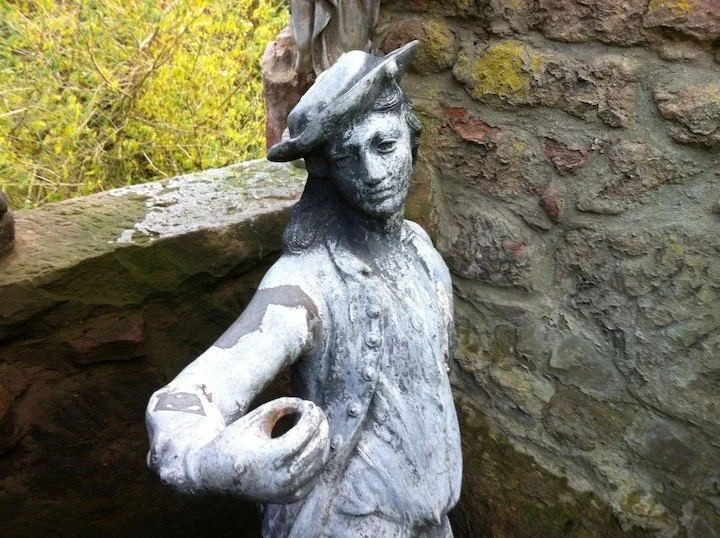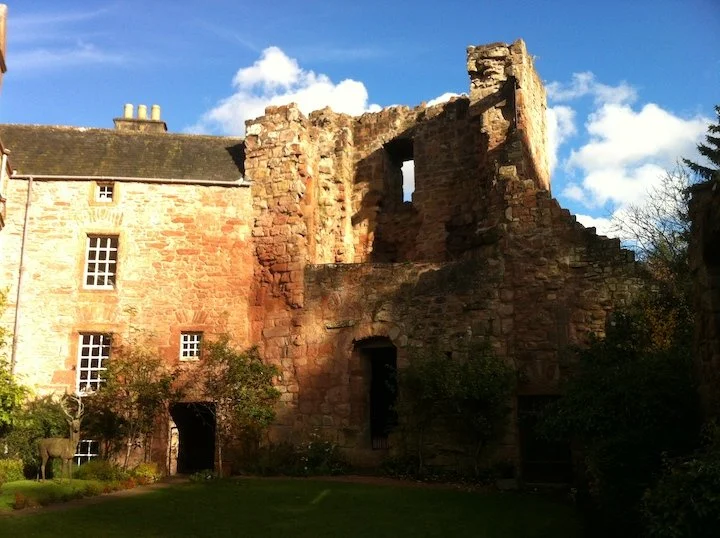At Hawthornden
I have been resident at the Hawthornden Fellowship in Scotland for the last month. Whilst there, I began to write prose for a blog, but this is the only part of it that ended up as a vaguely sustained piece, largely because poetry took over completely...
Three weeks in to my stint at the Hawthornden Fellowship, and the silence runs like a river through me. The rains have eased - the first week slipped away in a flood-rush of writing, but now I am beginning to see the new shapes the water's carved into the bank. It has been a period of absorbtion. Coming out in my work are the rhythms of walking through the Scottish landscape as the trees turn suddenly to the colours of a jeweller's window; the melodies and urgencies of bird life; the river, which carries all other noise away. More importantly, I have been reading fit to bust. The musics of nature, the breath-pulse of moving through it, are important to my writing, but I have been discovering and rediscovering other people's interpretations of these musics and, in doing so, have stretched my own.
Most revelatory so far in this deeper foray into reading is the relationship I have developed with Sean Borodale's Eliot-shortlisted book, The Bee Journal. It is a magnificent book, written, as the title suggests, in a notational journal style. Clipped as a Queen Bee's wing in places, Borodale's language nonetheless sings as subtly and compellingly as the bees he writes about, and his imagery is sharp and wide-ranging without ever sounding forced. I am profoundly, pleasantly jealous of this book.
I've also been rooting around in the work of: Les Murray, whose work I had never fully engaged with until now; Alice Oswald's first book, which I had not read before and which has been a joyous and surprising discovery, containing many lovely sonnets - I've been most engaged in Dart, A Sleepwalk on the Severn and Memorial in the last few years, so this book was surprisingly different; Timothy Donnelly's The Cloud Corporation, which I had struggled to read before heading to Hawthornden, despite the recommendation of Katy Evans-Bush, because of the difficult layout - the poems are worth the fight through the dimly lit typography to discover and I wish Picador would reset it for the next edition.
Poetry is a curious artform, built on contradictions and oxymorons, silence and sound, long, tender consideration and the giddy, brief and sometimes painful rush of inspiration. I cannot say without gushing how precious it is to have been sat in the heart of a glen without the pressures of reality and the need for money rearing up all around like horses ridden by thin horsemen dressed in black all over the place. So of course I’ve been writing about noise in the silence.
Home now, with a manuscript in tow and a clearer head. Plus a a bunch of horsemen to contend with. Oh well. It was a pleasure, having read at the Poetry Parnassus in the summer, to reach further into international waters at Hawthornden. I was lucky enough to share the castle with Canada’s Jeramy Dodds, Hungarian novelist Gergely Nagy and British poet Gill McEvoy (who, in a coincidence typical of this sort of retreat, went to the my home town’s High School for Girls). Excellent people all!
ADVICE FOR ANYONE GOING TO HAWTHORNDEN
Beware the Lemon Posset. It is dangerous. More so because it is also utterly seductive.



